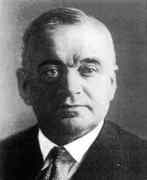Person: Fueter, Karl Rudolf

Rudolf Fueter was a Swiss mathematician, best known for his work on number theory.
Mathematical Profile (Excerpt):
- Rudolf studied in his home town of Basel before going to Göttingen in 1899 to study under Hilbert.
- After obtaining his doctorate Fueter travelled to various European centres of mathematical activity.
- Five years later, in 1913, Fueter left Basel to take the chair of mathematics at the Technical University of Karlsruhe, a post he only held for three years before moving to the chair at the University of Zürich.
- Fueter's first major publication was Synthetische Zahlentheorie Ⓣ(Synthetic Number Theory) which he published in 1917 soon after taking up the chair at Zürich.
- The work was a very successful one, a third edition being published in 1950, the year of Fueter's death.
- Between the two volumes of Vorlesungen über die singulären Moduln und die komplexe Multiplikation der elliptischen Funktionen Ⓣ(Lectures on the singular moduli and the complex multiplication of elliptic functions) Fueter published another major work, Das mathematische Werkzeug des Chemikers, biologen und Statistikers Ⓣ(The mathematical tools of the chemist, biologist and statistician) which was first published in 1926 and also ran to three editions, the third in 1947.
- Fueter was a cofounder of the Swiss Mathematical Society, which came into existence in 1910, becoming its first President.
- Perhaps surprisingly Fueter also held the rank of colonel in the artillery of the Swiss army.
- Despite being surrounded by Nazi and fascist controlled countries, Switzerland remained the only democratic state in central Europe and Fueter played an important role in that process.
- Fueter developed his argument more fully.
Born 30 June 1880, Basel, Switzerland. Died 9 August 1950, Brunnen, Switzerland.
View full biography at MacTutor
Tags relevant for this person:
Origin Switzerland
Thank you to the contributors under CC BY-SA 4.0! 

- Github:
-

- non-Github:
- @J-J-O'Connor
- @E-F-Robertson
References
Adapted from other CC BY-SA 4.0 Sources:
- O’Connor, John J; Robertson, Edmund F: MacTutor History of Mathematics Archive
